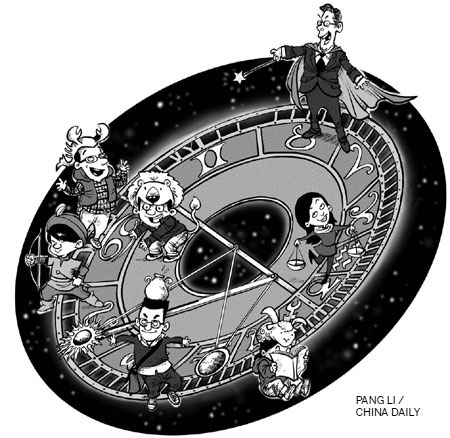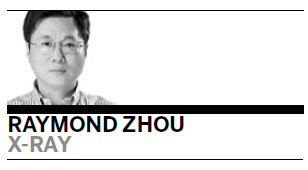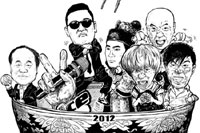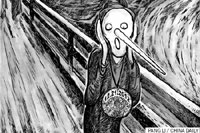Starry-eyed learning
Updated: 2013-01-05 10:02
By Raymond Zhou (China Daily)
|
||||||||
 |
|
[Photo by Pang Li/China Daily] |

Unconventional courses offered by some Chinese universities have upset the traditionally sensitive, but I say education should tickle the mind rather than cram one's brain with textbook knowledge.
Will you be happier if everyone in your class shares your astrological sign? What if all courses are divided into twelve classes that fit neatly into the horoscope?
That would be like paradise for those obsessed with stars and their influence on human affairs, or it seems.
The news that Yangzhou University has adopted a pedagogy based on astrology has riled many online, who, as usual, rushed to denounce it without taking the trouble to confirm its truthfulness. Again, what really happened was more complicated and also more interesting than the attention-grabbing headlines.
It turns out that the experiment with astrology has nothing to do with school authorities, who maintained they have no intention to incorporate it into their present or future curriculum. It was the extracurricular choice of a student body in an effort to attract an audience. The rationale goes, even compulsory courses often fail to fill up the classroom, and as this is not even an elective one, how can we bring in enough students?
So, the student organizers designed it with the zodiac diagram in mind. A class on the unsolved mysteries in biology was targeted at the Scorpio, who are supposed to possess acute observations and deep thinking. The Taurus are thought to be even-tempered, therefore suitable for the tedium of genetic engineering tests.
Related: Blessed month for movie lovers
A freshman enthused about her experience: "I have a strange feeling of joy to be sitting with people of my sign in one classroom."
I do not fault her for that irrational feeling. In the glut of school offerings, she needed that extra zing to bring herself to one more class. Hopefully, she would find what's taught useful and realize that the astrological bent is just a ploy to get her attention.
Of course, there are people who believe astrology is a solid science, rather than a pseudoscience, that should dictate everything we do. There is no way I can change their minds about it. A statement by 186 astronomers, physicists and leading scientists in 1975, titled "Objections to Astrology", did not curb the craze for it. And I'm no scientist.
Related: When a star loses its luster
Simply for its entertainment value, astrology probably should not fall outside the academic vista. If so many of today's young are into it, shouldn't sociologists make a study of the phenomenon? Our universities and colleges are constantly accused of losing touch with the real world, yet whenever someone makes an effort, albeit haphazard and clumsy, the world seems to jump on him for being unfaithful to the spirit of academia.
The Chinese public has a split mentality towards institutions of higher education. We tend to idolize them as an ivory tower untarnished by the outside world. Professors and students are supposed to study esoteric disciplines that purify the soul. This goes back hundreds of years when the imperial exam grilled contestants on every detail of the ancient classics, and once someone came out the top winner, he would be thrust into officialdom that managed public affairs.
Can you imagine the chasm between a geeky scholar and a worldly supervisor of civil management? No wonder the country got itself on a non-stop downward spiral for the duration of the imperial-exam system.
I dare say, if it had been a Chinese school that started teaching business management, there would have been relentless scolding from all walks of life - how the sacred place had been depraved and gained an odor of commercialism, etc. Many of us seem to harbor the notion that the kind of practical knowledge most needed in daily lives is better left self-taught. That is part of the reason sex education keeps running into invisible walls of opposition in any school and any grade.
Meanwhile, employers have been complaining about the shortage of college graduates who are ready to step into positions that requires job skills. They tend to be "high in eye and low in hand", to quote an oft-repeated Chinese phrase for the unique combination of aiming high and scoring low. It is said that students who were involved in school activities are most welcome by employers because their training went beyond academic into the realm of the practical.
Granted, it is difficult for a youngster in his or her early 20s to intuit what's useful and what's not. When I was in college, there was no choice. The curriculum was set for us. So, it was the extra-curricular reading that determined where I was heading, and the crowds I was hanging out with and their hobbies and conversations. Nowadays, the options are dazzling. One has to be discerning not to be tempted by every nice-sounding subject. Or as I would suggest, go ahead and try it out for a class or two, and then decide whether it's worth a semester of intensive study.
Into this witches' brew are now added new ingredients such as mahjong-playing and tree-climbing. Several universities have listed the tile-matching game as an elective, but they have to cite the precedence of similar courses in Western countries, rather than the game's Chinese origin, as the raison d'etre for pedagogical treatment. Can't they simply say this is part of Chinese culture and should be treated as such? No, that would have incited more taunting. "They are teaching it in the West" is the most effective way to shut up online loudmouths who blurt out what's on their mind without any system of checks and balances - or research for that matter.
The tree-climbing course at Xiamen University was indeed the result of its president being inspired by a similar course in the US. It was designed partly as a survival skill and partly a sports activity. Students responded with zeal and the class of 60 was quickly filled up.
There are dubious courses just as there is plenty of dubious knowledge floating around us. Something does not become sanctified because it has found its way into a college syllabus. It is also a student's job to sift chaff from wheat. Besides, one person's chaff can be another's wheat. So, one should refrain from jumping to conclusions simply based on a course's name, let alone a headline describing the course, made by someone who presumably has never sat in the class.
It is hard to judge a course even by its detailed description. The subject can be interesting and relevant, but the teaching style may be old-fashioned and boring. Conversely, there are teachers who are capable of turning such subjects as mathematics into fascinating lectures.
The new courses may not have staying power. Many will be revised and improved as they go from one semester to the next. If education wants to incorporate applications of the real world, it has to invent new courses all along. I took "Political Economics" four times while in school - once in junior high, once in senior high, and again in college and graduate school. I could recite lengthy passages from the largely identical textbooks, but learned almost nothing about either politics or economics. For example, it did not prepare me in any way for the real politics, with Chinese characteristics, of banquet-table talk or water-cooler talk, both of which exert a palpable influence on one's career advancement.
If only the colleges I attended offered that kind of wisdom.
Contact the writer at raymondzhou@chinadaily.com.cn.
|
 |

 'Taken 2' grabs movie box office crown
'Taken 2' grabs movie box office crown
 Rihanna's 'Diamonds' tops UK pop chart
Rihanna's 'Diamonds' tops UK pop chart
 Fans get look at vintage Rolling Stones
Fans get look at vintage Rolling Stones
 Celebrities attend Power of Women event
Celebrities attend Power of Women event
 Ang Lee breaks 'every rule' to make unlikely new Life of Pi film
Ang Lee breaks 'every rule' to make unlikely new Life of Pi film
 Rihanna almost thrown out of nightclub
Rihanna almost thrown out of nightclub
 'Dark Knight' wins weekend box office
'Dark Knight' wins weekend box office
 'Total Recall' stars gather in Beverly Hills
'Total Recall' stars gather in Beverly Hills
Most Viewed
Editor's Picks

|

|

|

|

|

|
Today's Top News
Boston bombing suspect reported cornered on boat
7.0-magnitude quake hits Sichuan
Cross-talk artist helps to spread the word
'Green' awareness levels drop in Beijing
Palace Museum spruces up
First couple on Time's list of most influential
H7N9 flu transmission studied
Trading channels 'need to broaden'
US Weekly

|

|









